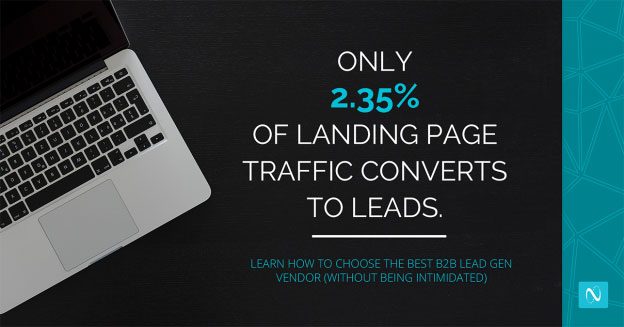Only 2.35% of visitors coming to your landing page actually become leads.
That’s right. 2.35%.
To say that another way, roughly 97% of all lead gen budget spend is wasted. Considering how vital new leads are to B2B organizations, this is something that should be addressed immediately. Fortunately, there are plenty of tools and vendors in the MarTech space designed to focus on these challenges.
However, given the volume of companies to choose from and so many people within the organization to please—all while staying within budget, mind you—choosing the right partner can get a little stressful.
Breathe easy, B2B explorer. You’ve come to the right place.
Finding Common Ground
While every department inside of a B2B organization has its own set of KPIs and ambitions, every employee has at least one shared goal: Generating more leads. Despite this fact, each department that plays a role in the success of generating qualified leads has needs themselves—many of which aren’t universally shared across the organization.
For example:
- Marketing wants to increase brand awareness and have complete control over the look and feel, messaging, etc.
- Sales wants to consistently and efficiently expand its pool of qualified leads regardless of how it happens
- C-Suite wants a decision yesterday having exhausted every cost-savings opportunity
Regardless of their specific challenges, each member of the organization recognizes the importance of new leads. To accomplish this, your organization looks to vendor partners to streamline the process and maximize its success rate.
Finding a solution for all of these needs should be a piece’a cake, right?
The next question, of course, is how to do this.
Establish Your Process
To find a B2B lead generation tool to do it all, the key to eliminating the stress and intimidation of finding the right partner hinges on keeping it simple.
In many scenarios, determining which vendor fits you best comes down to organizational preference. However, painting everything with a broad “it depends” brush helps no one.
To guarantee that you’re approaching this properly, you must develop a strategic plan of action that covers everything your business needs to know before making a final decision. A significant portion of this falls squarely on Marketing’s shoulders. They are responsible for making sure all of the information customers need is readily accessible, while this data is easily passed along into your CRM where Sales can jump right into the mix without missing a beat.
Achieving this type of seamless experience depends on the thoroughness of your B2B vendor evaluation process. To assure you have everything necessary to find the best partner, familiarize yourself with these six elements.
The 6 C’s of Vendor Evaluation
Focusing on these fundamentals will make the process much simpler (and certainly less stressful).
1. Checklist
At every step in the process, knowing what you need to know is critical.
Marketers, for example, should be looking for partners to offer free-trial accounts that allow you to get acquainted with the platform.
Your checklist should focus on:
- Primary Features
- Ease of Use
- Industry Experience
- Technical Specifications
- Standard Integrations
- Support
There are probably dozens of other requirements you can include for your own checklist (like only paying for leads you want and providing simple CRM integration) but these are the basics everyone should consider. If you’re looking to get a bit more information, think of adding these to your standard list of questions.
- Do they have experience in your industry?
- Do they welcome and embrace customer feedback publicly on vendor comparison sites such as G2?
- How do they get the leads?
- How do they qualify leads?
- If they promote primarily via email, ask them how you can opt-in to their newsletters so you can see the flow and underlying value-prop being offered.
- Are their pricing models in-line with your risk tolerances and campaign objectives? (Spending on a CPC/CPM basis places much of the risk on to you as the client.)
- How do they hand off the leads?
2. Consideration
Perhaps the most intimidating part of the vendor selection process (potentially!) is deciding who should be on your shortlist. If you’ve been working in B2B for quite a while, it’s likely that your peers, former colleagues, and trusted resources of information will point you in the right direction or, better yet, will make an introduction for you with the vendor they prefer.
If you’re completely new to B2B, don’t sweat it; your first step should be quite familiar. Google best B2B lead generation companies to get a sense of who exists and what they offer. You should then check G2 and Trustpilot with the same search query to compare various company ratings and reviews.
Asking your network through LinkedIn and other professional membership groups is a smart way to build your list, too.
3. Capabilities
Regardless of the other C’s listed here, the biggest reason you’d even consider one vendor over another is due to their capabilities.
The success of your marketing initiatives will be judged by their outcomes. The tools you use to execute your strategies and campaigns will have a tremendous influence on their effectiveness with your buyer audience and therefore how many leads you’re able to generate.
In this case, since you’re trying to determine the best vendor to deliver high-quality leads, you’ll need to investigate how each lead is sourced, audited, and how successful each particular vendor is within your verticals.
As you vet your shortlist of potential partners, record each candidate’s strengths and weaknesses to see how they stack up. Take as many detailed notes and ask as many challenging questions as you can during each interaction with vendor reps.
4. Customer Centricity
Client communication and focus is an essential element of any vendor relationship. Not only does it establish trust, keeping the conversation going reduces the chance of missing vital information.
While so much of this evaluation is informational and based on logic, this is one portion of the 6 C’s that can legitimately be a “gut” feel.
For example, if, in your exploration of B2B lead generation tools and demos, you find that company X isn’t responding to your questions within 24 hours, they’re probably not the organization you want to work with. At NetLine, we make it a priority to respond to clients and prospects as quickly as possible, even if it’s just to acknowledge them while we’re finding the exact answer they need.
This also underscores why ratings and reviews are so important in these evaluations. As Joey Coleman points out in his book, Never Lose a Customer Again: The First 100 Days, businesses sometimes like to pull the carpet out from under you once you’ve signed on the dotted line. They’ll do everything they can to get you to say, “I do”, only to stick you with someone you’d never met during the dating process.
That’s a pretty crummy customer experience—especially from a B2B lead generation vendor.
5. Character
“Treat people like you’d want to be treated.” It’s known as the Golden Rule for a reason.
Every vendor will treat you differently…and how they do will (or at the very least should) influence your final decision.
Regardless of what they say on their website, over the phone, or even by proxy of dozens of reviews, each interaction you have is an opportunity to learn more about what’s true. Every exchange will color your perception of the company and how you can expect to be supported and respected moving forward.
If you find that you’re really clicking with your sales rep, love the demos you’ve seen, and everything else on your list of must-haves is getting checked off with gold stars, you’ve probably found a winner. Conversely, if you’re forcing yourself to like a vendor simply to justify the time and energy you’ve put into the B2B lead generation vetting process, it might be time to move on. Don’t waste your time with vendors you don’t resonate with.
6. Cost
The total cost of doing business with a B2B vendor goes well beyond what you agree to pay.
You should always take into account how much a given vendor will save you, how many more leads you’ll bring in compared to your current setup, and the time and energy it saves your team, therefore making them more readily available for other projects.
In addition, take into consideration the cost of working with a subpar vendor. While this entire breakdown is meant to relieve you of any potential worry, we’d be remiss if we didn’t caution you of the losses associated with making the wrong choice. But like we said, you needn’t worry about such things, as you’re a smart, beautiful person who follows their process to a T.
Choosing the Best B2B Lead Generation Partner for You
Ultimately, you’re looking for a vendor that can help you scale without wasting your budget.
With that in mind, NetLine is a tremendous solution for B2B organizations looking to solve their lead gen woes. Our platform delivers your content directly to a target audience interested and invested enough to convert into an actual lead.
In the words of one of our clients, Lilach Bullock, “NetLine helps B2B marketers drive lead generation success through content syndication campaigns that actually yield leads.” Since our model focuses on CPL (cost per lead), we give marketers the ability to hyper-focus on the exact type of industry professionals they’re looking to reach.
With NetLine, you can access the largest B2B buyer engagement and lead generation platform on the internet without phone calls, long negotiations, or an overextended design team. The best part? You only pay for leads that meet your hyper-filtered criteria.
With our exclusive AudienceTarget™ content recommendation logic, NetLine amasses first-party content consumption activities of 125 million professionals downloading more than 700 thousand buyer-specific pieces of content each month. Superior quality, on-demand access, and interactive campaign reports deliver measurable ROI, enabling marketers to achieve lead generation success.
You can create a free NetLine Portal account immediately and start a lead gen campaign in minutes.

